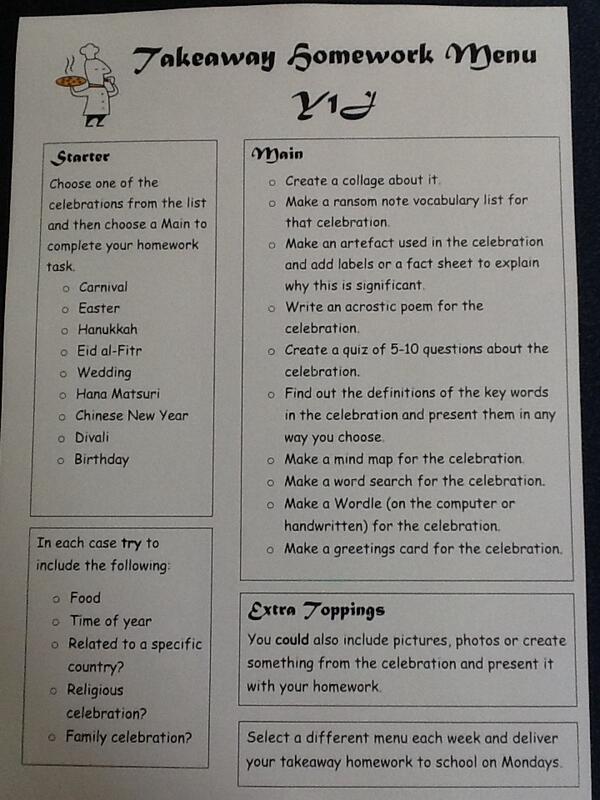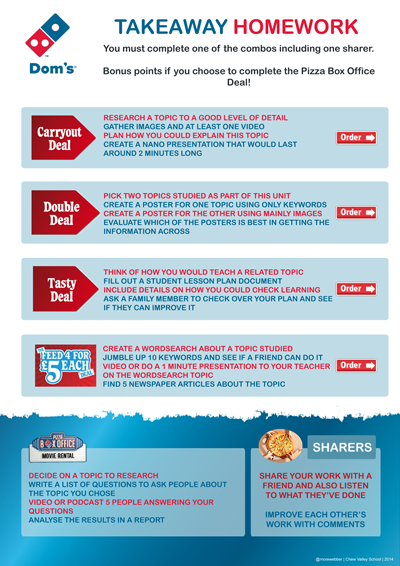Quick link to the crowd sourced homework doc in case you have just dropped in for that.
A highly contentious issue, homework matters have made me groan inwardly, grit my teeth and smile on many occasion. From complaints of too much, too little, or the lack of spellings, to the families who ask for more, but neglect to 'hear' their children read, I take the criticisms and try my best to do something about it.
When I first became an infant teacher it was in the wake of an outstanding OfSTED inspection. One of our next steps was the suggestion of taking the EYFS learning journals into the 2/1 classes, so I devised a way of doing this with my colleague. I had a strong idea, she had a strong name for it! We named our homework folders Learning@Home and put in a new sheet of A4 each week. We wanted the homework activities to be as practical as possible - activities that could often be done in the car, walking home from school or at the dinner table, so that lack of time could not be a reason for not doing them. We were keen to make sure that families were as involved as possible in their child's education, so rather than hand over worksheets, we tried to think of activities that would generate discussions and extend children's learning.
Responses from my twitter colleagues within 12 hours. Thanks as always! :-)
A highly contentious issue, homework matters have made me groan inwardly, grit my teeth and smile on many occasion. From complaints of too much, too little, or the lack of spellings, to the families who ask for more, but neglect to 'hear' their children read, I take the criticisms and try my best to do something about it.
When I first became an infant teacher it was in the wake of an outstanding OfSTED inspection. One of our next steps was the suggestion of taking the EYFS learning journals into the 2/1 classes, so I devised a way of doing this with my colleague. I had a strong idea, she had a strong name for it! We named our homework folders Learning@Home and put in a new sheet of A4 each week. We wanted the homework activities to be as practical as possible - activities that could often be done in the car, walking home from school or at the dinner table, so that lack of time could not be a reason for not doing them. We were keen to make sure that families were as involved as possible in their child's education, so rather than hand over worksheets, we tried to think of activities that would generate discussions and extend children's learning.
Last week I did a massive 'grin and bear it' after after I read in a school survey how the homework was too easy, a child did it in five minutes and although they were given additional challenges, these were on an ad hoc basis. Bearing in mind that reading is a daily homework activity, I felt a tad gobsmacked about this (gobsmacked enough to be bothered to write this post). I was annoyed at the fact that the very same week I had phoned the family to explain how, after putting an additional challenge in their child's tray, I had found a few that hadn't been taken home. This smacked of 'I don't want to do these' to me, so I suggested that the family take their child to the library and start an 'expert project'. The children in my class are 6/7 years old and the last thing I want to do is switch them off. Despite this, the comments were still made on the survey and I felt I had to justify what I had done (unnecessarily - my HT wasn't asking me to, I was needing to. Like I said, I was gobsmacked!) This is because, alongside daily reading and the weekly learning@home activities I had sent the following, additional activities home, most purchased at my own expense:
- Brain academy maths challenges
- Brain academy quests
- Achieve level 3 English
- Boggle
- Brain box geography game
- A choice of brain teaser puzzles (like the picture below)
- Level 3 maths activities
- Level 3 English activities
I've already said how reading is supposed to be a daily activity and I provided questioning sheets during parent's evening so that effective support and extension can be continued at home. I feel I've done my duty as a teacher and have been thinking about Carol Dweck's Mindset again. What I need to do is encourage families to take more responsibility for extending their children and enriching their knowledge, rather than it being my responsibility to continuously extend them. I don't want to switch children off at such an early age. So here's where you can help. I started to put a list together of extension activities that can be done at home. They are based on the things my family did with me when I was a wee one! Can you add anything?
Footnotes
Although I find the comments were unjustified, I do applaud parents who show interest and involvement in their child's education. One child in my class regularly brings in arty, creative work that they have completed at home, but complements topic work, and it is delightful. Although this is an entire new blog post, I do think that if we are to recreate the education systems that our current government aspires to, we are going to need to promote these kind of parental attitudes too.
Responses from my twitter colleagues within 12 hours. Thanks as always! :-)
These ideas are additional to ones on the document.
"One of our takes on "Takeaway Homework". In the style of Dominos #takeawayhwk pic.twitter.com/VUfCvxz1KW” @SheliBB this is a high school e.g.
@SheliBB topic was celebrations, had meeting for parents to explain &showed examples I made to give them some ideas. pic.twitter.com/29Qp5mD9OA
 |
| Shared by @Mrs_Twit24 though layout was devised by someone else |
- @SheliBB @traceyab1 @beckijennings @Kezmerrelda I like those philosophy for children questions....would you rather...?


 Julie B
Julie B  TeacherToolkit
TeacherToolkit 

 Sheli Blackburn
Sheli Blackburn  Tracey Bowers
Tracey Bowers  Jenni Porter
Jenni Porter  Becki Jennings
Becki Jennings
It's a long time since my children were 6/7, and I taught secondary. But I recommend things that interact with the world around - food labels, trees in the park, birds, street furniture. Getting children to look at things. Also imaginative/creative things - making, painting, folding bits of paper,
ReplyDeleteAlso, of course, reading.
Thank you - you just reminded me about the I-spy books my children had. And origami-that would be a great thing to learn!
ReplyDeleteSheli, I think that you are absolutely right about reading as one of the most important homework activities. There is a lot of talk about Homework "takeaway" menus on twitter at the moment. I think that I am going to do that to satisfy parents who want more and can be ignored by parents that can find interesting activities for them and their kids to do.
ReplyDeleteHow about a homework cafe to explain pedagogy behind it and a give parents a bank of activities to do.
Great idea to do a homework cafe- thank you JP! I'm undecided about the homework takeaways for infants, but may play around with the idea. I like what I've seen, but they are for secondary aged children and although one or two of my parents would love them, they would be a minority.
DeleteSome more examples from my class's home learning books
ReplyDeletehttp://woodpeckersclass.wordpress.com/2014/01/20/division-home-learning/
http://woodpeckersclass.wordpress.com/2013/11/28/russia-home-learning/
http://woodpeckersclass.wordpress.com/2013/11/04/half-term-home-learning/
http://woodpeckersclass.wordpress.com/2013/10/11/home-learning/
http://woodpeckersclass.wordpress.com/2013/09/30/food-journeys/
We also include a list of basic maths and literacy practice skills at the front of our home learning books to be worked on throughout the year eg HFW list, times tables, number bonds, halving and doubling, adding and taking away 1 and 10 etc
There is also a link to our VLE where there are lots of games and activities linked to our learning.
We use the Bloom's Project grid for topic based homework every 2nd 1/2 term from Y1-Y6. It is similar to the Takeaway style homework. Examples of Y1 Bloom's Homework can be found at http://www.troon.cornwall.sch.uk/site/24927-our-school/section-19391-curriculum/page-102148-blooms-project-homework Y2-6 examples will follow soon - I'm still working on our new website. I think it works well and it’s differentiated by outcome -I've had children completing activities without any parental input because they are enthusiastic learners to creations that have parent/sibling input.
ReplyDelete